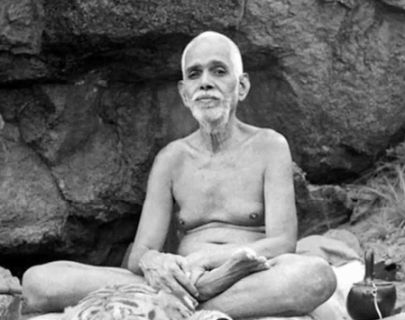 Ramana Maharshi (1879 - 1950) became known in West: 1934
Ramana Maharshi (1879 - 1950) became known in West: 1934
Ramana Maharshi was born Venkataraman Iyer in Tamil Nadu, South India. At the age of 16 he had a "spiritual awakening" and secretly left his family and caught a train to the sacred mountain of Arunachala at Tiruvannamalai where he remained until his death. He became a famous ascetic living in caves and an ashram gradually grew up around him. While he had the usual strange states of consciousness and recounted powerful experiences normal in a famous Indian saint he also had good organisational skills and a Protestant work ethic, unusual in Indian ascetics. His fame was spread as many of the tens of thousands of pilgrims to the Annamalaiyar Temple would come for the Maharshi's darshan while there.
 Ramana Maharshi became relatively well known in the West after 1934 when Paul Brunton, who had visited Arunachala in 1931, published the book A Search in Secret India in which he extolled Ramana. He achieved a wider fame after W. Somerset Maugham wrote "The Razor's Edge" using Ramana as the model for the "holy man." The fact that Maugham had fainted and remained unconscious for some time whilst at the ashram added a particularly "spooky" mystical authority to the Maharshi. Whilst Brunton's book was a best-seller, Maugham's book was even turned into a Hollywood movie.
Ramana Maharshi became relatively well known in the West after 1934 when Paul Brunton, who had visited Arunachala in 1931, published the book A Search in Secret India in which he extolled Ramana. He achieved a wider fame after W. Somerset Maugham wrote "The Razor's Edge" using Ramana as the model for the "holy man." The fact that Maugham had fainted and remained unconscious for some time whilst at the ashram added a particularly "spooky" mystical authority to the Maharshi. Whilst Brunton's book was a best-seller, Maugham's book was even turned into a Hollywood movie.
Ramana Maharshi stressed "Self-enquiry" as the most direct way of realizing Self-awareness, when asked about liberation and Vedanta generally. He empowered no followers to teach or create a lineage in his name. There was no "official" lineage, a simple teaching and little doctrine. This allowed any person who chose to declare themselves a Realised Advaita guru to do so without receiving criticism from Maharshi's lineage holders. The most influential of such people was Hariwansh Lal Poonja (1910? - 1997) who has become wel-known in New Age circles as Poonjaji aka Papaji. A modern cottage industry has arisen in American gurus who blithely proclaim all over the interent that they had received "transmission" from Poonjaji, achieved "Sudden Realisation" and were officially enlightened. This is controversial in many ways not being that Poonjaji made some very nasty slurs on these people.
In the following excerpt from an interview he talks about his students including the "ambassadors" he authorized to teach. - Nothing Ever Happened Vol. 3. by David Godman, p. 366‒67.
David: You used to give experiences to a lot of people. Why did you do it if you knew that the effect would not be permanent?
Papaji: I did it to get rid of the leeches who were sticking to me, never allowing me to rest or be by myself. It was a very good way of getting rid of all these leeches in a polite way. I knew that in doing this I was giving lollipops to the ignorant and innocent, but this is what these people wanted. When I tried to give $100 bills to them, they rejected them. They thought that they were just pieces of paper. So I gave them lollipops instead.
David: Many of the people you gave lollipops to left Lucknow thinking that they were enlightened. Does the fact that they accepted the lollipop and left indicate that they were not worthy to receive the $100 bills?
Papaji: If one is not a holy person, one is not worthy to receive the real teaching. Many people think that they have attained the final state of full and complete liberation. They have fooled themselves, and they have fooled many other people but they have not fooled me. A person in this state is like a fake coin. It may look like the real thing. It can be passed around and used by ignorant people who use it to buy things with. People who have it in their pocket can boast of having a genuine coin, but it is not real. But it has no value. When it is finally discovered to be a fake, the person who is circulating it, claiming that it is real, is subject to the penalties of the law. In the spiritual world, the law of karma catches up and deals with all people who are trafficking in fake experiences.
David: Many people have heard you say, 'I have not given my final teachings to anyone'. What are these final teachings, and why are you not giving them out?"
Papaji: Nobody is worthy to receive them. Because it has been my experience that everybody has proved to be arrogant and egotistic …
No doubt Poonjaji did not include himself in this "nobody" category.
Possibly the major figure in this group is or was Andrew Cohen a teacher so controversial that his mother has written a book severely criticising him cheekily titled The Mother of God. Though this group is fraught with dissension another one of it's major figures is one Gangaji.
Bibliography:
- A Search in Secret India - Paul Brunton
- The Razor's Edge - W. Somerset Maugham
- Enlightement Blues (2003)- Andre van der Braak
- The Mother of God (1997) - Luna Tarlo
Back to Gurus Page.